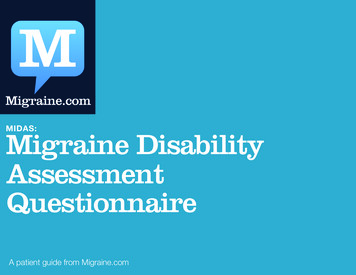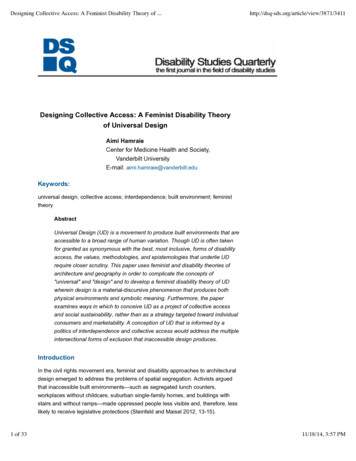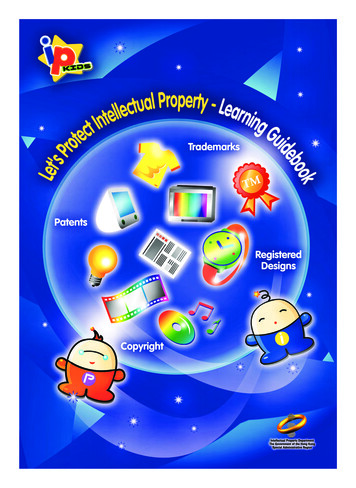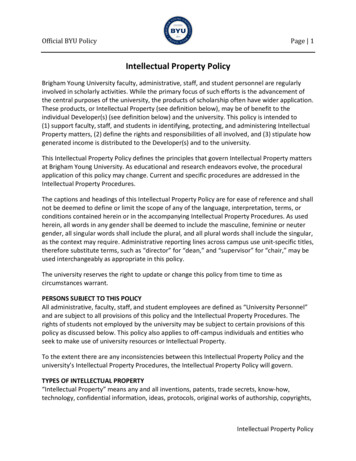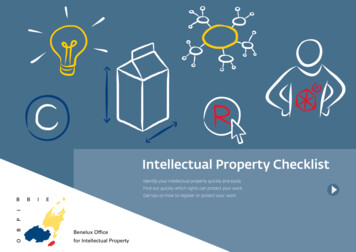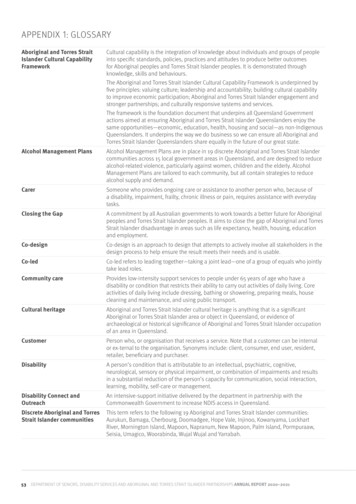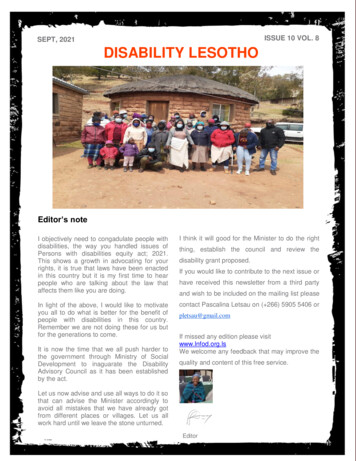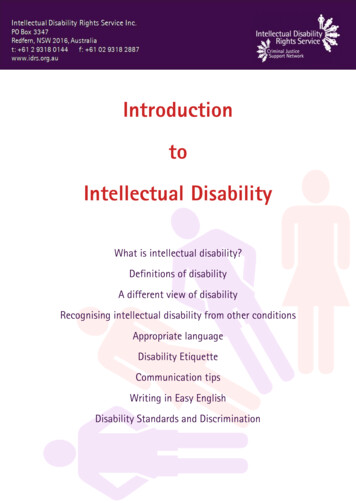
Transcription
IntroductiontoIntellectual DisabilityWhat is intellectual disability?Definitions of disabilityA different view of disabilityRecognising intellectual disability from other conditionsAppropriate languageDisability EtiquetteCommunication tipsWriting in Easy EnglishDisability Standards and Discrimination
What is intellectual disability? a disability that affects the way you learn you can be born with an intellectual disability or acquire one under the age of 18 it can affect a person in the following ways:oit may take longer to learn thingsothe person may have difficulty reading and writingoit can affect how the person’s communicationoit will affect the person’s understandingothe person may find it difficult to maintain eye contactothe person may have difficulty understanding abstract conceptsoit may affect the person’s ability to plan and to problem solve it may affect the person’s ability to adapt to new or unfamiliar situations it can involve the person presenting well ‟ “cloak of competence”Clinical definition of intellectual disabilityIntellectual disability is a disability which occurs in the developmental period of life (i.e. before the ageof 18) and is characterised by below average intellectual functioning. Most people with intellectualdisability are born with the disability.Clinically, and for the purposes of proving in a court that a person has an intellectual disability,intellectual disability is best assessed by a psychologist as: an IQ of 70 or under, PLUSdeficits in at least 2 areas of adaptive behaviour, ie:o communicationo self-careo home livingo social skillso self directiono leisure and worko learning.2-3% of the New South Wales population has an intellectual disability IDRS Inc. 2009Introduction to intellectual disabilityPage 2 of 16
In clinical terms, intellectual disability is often defined in terms of the severity of the disability:Level of disability% of people with intellectual 30-55SEVERE5%under 30This approach, however, encourages a focus on the deficits of the person, rather than the abilities and isa “medical” way of looking at disability, but for the purposes of proving to a court that a person doeshave an intellectual disability, it is what is required.This is the medical model of disability“People with disability should adapt to the world as it is” IDRS Inc. 2009Introduction to intellectual disabilityPage 3 of 16
Sociological definition of intellectual disabilityA more constructive and pragmatic definition is to define intellectual disability in terms of the supportneeds of an individual. This approach sees the effect of the disability as something that will vary and canbe increased or decreased by external factors. It does not view intellectual disability as an unchangeablecharacteristic of the individual. This definition does not rely on the capacity of the person being set instone, but also on the environment and the support that they receive.So, adjusting the environment and the support to meet the person’s needs can increase the person’scapacity and reduce the effect of the disability!The social model sees the 'cure' to the problem of disability in the restructuring of society. Unlikemedically based 'cures', which focus on the individual and their impairment, this is an achievable goaland to the benefit of everyone. This approach suggests that the individual and collective disadvantage ofpeople with a disability is due to a complex form of institutional discrimination as fundamental to oursociety as sexism, racism or heterosexism. IDRS Inc. 2009Introduction to intellectual disabilityPage 4 of 16
Intellectual disability is different from other cognitivedisabilities Mentalooo Brain injuryo can be caused by stroke, accident or drug/alcoholo can impair memory, thinking, perception, attention and emotions. The brain injury canresult in disinhibited behaviour or poor impulse control.o People rehabilitate over time i.e. yearso For further information: contact the Brain Injury Association Ph 9749 5366. Website:www.biansw.org.au Dementiao loss of short-term memoryo progresses into confusion/disorientationo Alzheimer’s Disease is one type of dementiao For further information contact the Alzheimer’s Association Ph 9805 0100. Website:www.alznsw.asn.au AutismoooooillnessOften episodicAffects perception and moodE.g. Schizophrenia, Depression, Bipolar Affective Disorder (used to be known as manicdepression)o For further information contact the Mental Health Information Service 9816 5688.Website www.mentalhealth.asn.auo IDRS Inc. 2009Lifelong developmental disabilityAffects ability to relate to people and the world around themImpairs social interaction, communication and behavior ( eg may becompulsive)Often experience overwhelming anxiety, frustration, confusionMost people with autism have some degree of intellectual disability but not all. Peoplewith Asperger’s syndrome generally have average to above average on to intellectual disabilityPage 5 of 16
The Power of LanguageThe use of appropriate language is not just an exercise in political correctness. It is exercising respect forthe people that you are speaking about or to.Language is not fixed and changes with time to reflect changes in government policy, public perceptionand, for many groups, a move towards more equal opportunity.Up to the 1980’s policies of institutionalisation for “handicapped” people were the norm. People lived incramped wards where their basic physical needs were met and little else. These people were seen asnumbers in many cases. They were seen to have no value in society; they could not work or contribute inany way. Words like “mongol”, “retard”, “spastic” and “handicapped” were socially acceptable.Today, due to new models of disability and a move towards people with intellectual disability living andworking in the community, we have come to realise that people with intellectual disability have a placein society and make valuable contributions in daily life. People with intellectual disability have families,get married, get divorced, get emotional and get in trouble the same as everyone else!!!Disability is not an illness. It is part of a person’s identity but it is not all that a person is. People withintellectual disability do not suffer, are not afflicted with and are not victims of their disability.When thinking about language, always think “person first”.Do sayDo not sayPerson who has/ person with/ person who Victim of/ crippled/ suffering from/ afflicted by. Do not usehas experiencedwords that invite pity or reinforce impressions of frailty ordependence.Wheelchair user/ person who uses a Wheelchair bound or confined to a wheelchair. Rememberwheelchairthat a wheelchair can represent freedom to its user.Person with a disabilityInvalid. Don’t equate illness with disability.Person who has epilepsyEpileptic. Remember this is a person first not a medicalcondition.Person who has cerebral palsySpasticPeople with disability/ with autismThe Disabled/ The Autistics. This makes people withdisabilities seem like a group who are separate from therest of society IDRS Inc. 2009Introduction to intellectual disabilityPage 6 of 16
Disability Etiquette„Offer assistance to a person with a disability if you feel it is appropriate but wait for ananswer before you help. Remember it is their right to say no. Do not assume you know thebest way of helping - listen to instructions you are given by the person.„Treat adults like adults. Do not use gestures more suitable for children.„Do not refer to an adult as “cute” or “adorable”. Would you use these kinds of terms whenspeaking about a person who did not have a disability?„If someone is a wheelchair user, do not lean on their chair. The chair is part of the personalspace of the person using it.„Make appropriate physical contact with people with disabilities according to the situation,the same as anyone else (e.g. handshake on introduction). Some people with intellectualdisability may for various reasons have inappropriate social responses. (e.g. hugging orkissing new people or in work situations). It is important to establish appropriate boundariesthat both you and the person are comfortable with. On the other side of this, a person whohas autism may be uncomfortable with any form of physical contact but it is important tooffer.„Talk directly to the person not through a support worker or companion. Make eye contact.„When speaking to a wheelchair user, position yourself at eye level if possible.„Do not be embarrassed about using common expressions such as “I’ll see you later” whentalking to someone with a visual impairment.„Do not make assumptions about the severity of disability. Some people hide their disabilitybetter than others.„Just because a person does not communicate verbally, doesn’t mean they do not understand.„In the same way, just because a person speaks very well does not mean they DO understand.Ask questions to check understanding if you are unsure.„Do not shout at a person if you think they cannot hear you or they do not understand. Ifthey cannot hear you this will not help. You may need to write it down.„Facial gestures and expressions help people who have hearing problems to understand you.Do not hide your mouth or look away when speaking.„To attract someone’s attention, a light touch on the shoulder is okay.„If someone has speech problems, give them your whole attention. Be patient. Do not corrector speak for the person. Resist the temptation to finish the sentence.„If you have difficulty understanding, don’t pretend. Repeat what you do understand and letthe person’s reaction guide you. IDRS Inc. 2009Introduction to intellectual disabilityPage 7 of 16
Robert’s 7 Point PlanRobert Strike is a leading advocate for people with intellectual disability in NSW, and has years ofexperience in the community sector working to improve the lives of members of the community. Look beyond the disability label - you will be surprised. Labels are forjars not people! Talk to us, NOT at us or through others. Hearing is not enough. Listen to us and respect what we say. Do things with us, NOT for us. Explain things slowly and get straight to the point. Talk to us face to face. Be honest with us we have antennas for bullshit!!! IDRS Inc. 2009Introduction to intellectual disabilityPage 8 of 16
Improving Communication with People with an IntellectualDisabilityTipsBlockersAllow plenty of timeBeing rushedBuild rapport, start with something easy and ofinterest to the personNot taking time to put the person at easeInvite the person to say if they aren’t sure whatyou meanAssuming the person will tell you if they don’tunderstandLet the person tell the story in their own wordsand in their own time first. Then clarifyDoing all the talking. Firing question afterquestion. Closed questions or questions thatsuggest an answerDeal with one piece of information or questionat a timeToo much information or double barrelledquestionsCheck understanding but make sure the personknows this is to make sure you’ve explained wellenoughGiving more information without making surethat the person has understoodAsk open questions ‟ encourage the person totell their story at their own paceAsking closed questions or leading questionsthat suggest an answerAllow time for a response even if this is slightlyuncomfortable. Wait longer than you normallywouldRushing / not waiting for the answer. Needingto fill the silence.Coming in with moreinformation when the person is still thinkingabout the lastUse plain everyday languageJargon, technical language, long sentences,double negativesRelaxed body languageImpatient or worried body languageChecking for understandingProblem solving instead of listening IDRS Inc. 2009Introduction to intellectual disabilityPage 9 of 16
Easy ReadHaving an accessible environment is about being proactive not reactive. This means thinking about howwe present all of our information. Are letters that are written to clients accessible? Can clients access allthe information that you would expect any other client to access?To make written information more accessible the following tips areimportant 14 or 16 point„Size of print should be„Font should be easy to read (the nearest to handwriting is the easiest to read. The font inthis document is Comic Sans and is considered the most accessible)„Use no more than one or two fonts„Line spacing should be 1.5 ‟ 2„Use headings when you change subject or have a lot of text„Use short sentences. (Think of a world where the only punctuation is a full stop!)„Have one idea per sentence„Try not to use abstract concepts„Illustrations are important to help you get your point across if possible„Black writing on yellow paper is the easiest to read„Test your information if possible with a person with an intellectual disability. IDRS Inc. 2009Introduction to intellectual disabilityPage 10 of 16
NSW Disability Services Act 1993 &Disability Services StandardsAll NSW government funded services for people with disabilities have to meet the Disability ServiceStandards.These standards have been developed from the Disability Services Act 1993 (NSW). The basis of theDisability Services Act (DSA) is that people with disabilities have the same basic human rights as othermembers of Australian society. They also have the rights needed to ensure that their specific needs aremet. There are also Commonwealth Disability Standards which are very similar.Through regulating services to people with disabilities, the DSA aims to: maximise potential for people with disabilities;allow for further integration of people with disabilities;achieve positive outcomes such as increased independence, employment opportunities, etc;promote positive image.There are 10 Disability Standards, they are:1. Service Access2. Individual Needs3. Decision Making and Choice4. Privacy, Dignity and Confidentiality5. Participation and Integration6. Valued status7. Complaints and Disputes8. Service Management9. Family Relationships10. Protection of Human Rights and Freedom of Abuse IDRS Inc. 2009Introduction to intellectual disabilityPage 11 of 16
Making a complaintIf you believe that a service is not meeting one or more of the Disability Standards, you can make acomplaint to theCommunity Services DivisionNSW OmbudsmanTel: 9286 1000The Ombudsman oversees a system of Official Community visitors to residential services for people withdisability who can be helpful with problems in such services.DiscriminationDiscrimination is treating a person, or group of people, less favourably than others would be treated inthe same circumstances because of their membership of a particular group, such as having a disability,or being a woman.Discrimination can be direct or indirectDirect discrimination means someone is treated unfairly compared to someone else in the same orsimilar circumstances and this happens because of their being part of a particular group e.g. because oftheir sex, race, age or disability.Indirect discrimination is about unfair exclusion. It is where rules, practices, policies which appear to beneutral, and to apply to everyone, do in fact have an unequal impact - in effect excluding a group ofpeople from an opportunity. If the requirements imposed are unreasonable then it amounts to unlawfuldiscrimination. IDRS Inc. 2009Introduction to intellectual disabilityPage 12 of 16
When is discrimination unlawful?The following Acts make certain types of discriminatory behaviour unlawful:-Anti-discrimination Act (NSW)-Disability Discrimination Act (Commonwealth)-Racial Discrimination Act (Commonwealth)-Sex Discrimination Act (Commonwealth)-Human Rights and Equal Opportunity Commission Act (Commonwealth)These Acts are concerned with discrimination in a person’s public life.The most important Acts for people with an intellectual disability in NSW are the NSW AntiDiscrimination Act 1977 and the Commonwealth Disability Discrimination Act 1992NSW Ant-Discrimination Act 1977 provides that discrimination may be unlawful if it is based on oneof the following grounds: RaceDisabilitytransgender status sexagehomosexuality marital status registered clubsat school, college oruniversity accommodationAnd in the following areas: applying for a jobgoods and servicesat workCommonwealth Disability Discrimination Act (DDA)The DDA makes it unlawful to discriminate against a person based on disability in the following areas: IDRS Inc. 2009employment andwork relatedgoods and serviceseducation Commonwealthlaws and programsLandclubs andassociationsIntroduction to intellectual disability accommodationaccess to premisesused by the publicsportPage 13 of 16
Disabilities are covered whether they are categorised as physical, intellectual, psychiatric, sensory,neurological or learning disabilities. Discrimination against a person because they have some physicaldisfigurement, or because they have some disease-causing organism (eg HIV) present in their body isalso covered, as is discrimination when the person does not actually have a disability but is perceived byothers as having a disability. The Act also makes it unlawful to discriminate against a person because oftheir association with a person with a disability.How do you complain?There are two ways of seeking redress for discriminatory acts against people with an intellectualdisability1) Human Rights and Equal Opportunity Commission (HREOC) Complaints can be made within 12months after the discrimination has happened. Complaints can also be made where an act ofdiscrimination is proposed but has not yet happened.Tel: 1300 656 419 - Complaints Infoline2) Anti-Discrimination Board (ADB) Complaints can be made to the Anti-Discrimination Board withintwelve months of the time of the discriminatory act.Tel: (02) 9268 5555or1800 670 812How complaints are handledBoth acts are aimed at changing attitudes. There is therefore much more emphasis on education,negotiation and conciliation than on imposing penalties.Both bodies will try to conciliate a settlement. If your complaint to the ADB cannot be resolved byconciliation, then it can be referred to the Administrative Decisions Tribunal. If your complaint to HREOCcannot be resolved by conciliation, it may have to be heard by the Federal Court which is likely to costmore in time and money than the State Tribunal. IDRS Inc. 2009Introduction to intellectual disabilityPage 14 of 16
ComplaintsIt is ok to complainIf you want to make a complaint there are different places to go, it depends on what you want tocomplain about. Below is a list of contacts to make complaints for different reasons.Anti Discrimination Board (ADB)The ADB is the place to go for discrimination under the NSW Anti-Discrimination Act 1977.Tel: (02) 9268 5555or1800 670 812Human Rights Commission (HRC)HRC is the place to go for breaches to Commonwealth law such as the Racial Discrimination Act, SexDiscrimination Act, Human Rights and Equal Opportunity Act, Disability DiscriminationTel: 1300 656 419 - Complaints Infoline1300 369 711 - General enquiries and publicationsNSW Ombudsman, Community Services DivisionNSW Ombudsman, Community Services Division is the place to go to make a compliant about a servicefunded by DoCS (Department of Community Services) or DADHC (Department of Ageing, Disability andHome Care).Tel: (02) 9286 1000or1800 451 524Abuse and Neglect HotlineCan take complaints and refer callers for assistance regarding abuse or neglect of people with adisabilityC/- People with Disability (PWD) 9370 3100/1800 422 015 IDRS Inc. 2009Introduction to intellectual disabilityPage 15 of 16
The StarfishAn old man was picking up objects off the beach and tossingthem out into the sea. A young man approached him and sawthat the objects were starfish. "Why in the world are youthrowing starfish into the water?""If the starfish are still on the beach when the tide goes outand the sun rises high in the sky, they will die", replied the oldman."That is ridiculous. There are thousands of miles of beach andmillions of starfish. You can't really believe that what you'redoing could possibly make a difference!"The wise old man picked up another starfish, pausedthoughtfully, and remarked as he tossed it out into the waves,"It makes a difference to this one." IDRS Inc. 2009Introduction to intellectual disabilityPage 16 of 16
Clinical definition of intellectual disability Intellectual disability is a disability which occurs in the developmental period of life (i.e. before the age . intellectual disability is best assessed by a psychologist as: an IQ of 70 or under, PLUS deficits in at least 2 areas of adaptive behaviour, ie: o communication o self-care o home .

